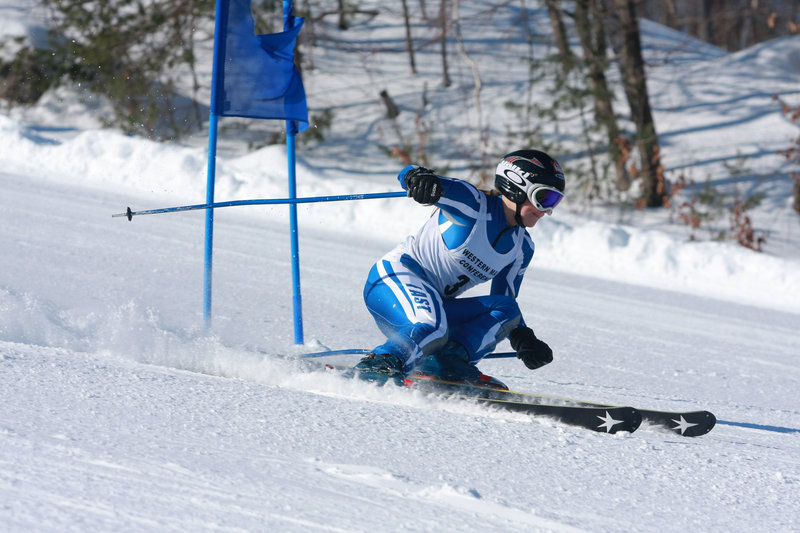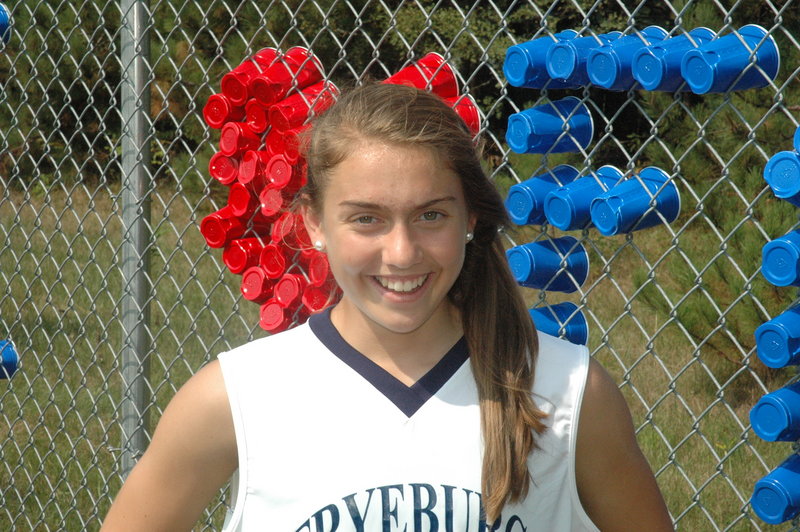FRYEBURG — Christina DiPietro heard the suggestion from a coach, which in fact was encouragement. To shave fractions of seconds off her time on the mountain, she should ski closer to the slalom gates.
What gates, she asked.
DiPietro is a 15-year-old sophomore at Fryeburg Academy. At 4, she was diagnosed with retinitis pigmentosa, which is slowly but surely impairing her vision. She is legally blind. To understand what she sees, take two normal drinking straws and hold them as close to your eyes as possible and come to grips with your new outlook on the world.
Understand, too, that DiPietro is the best Alpine skier on a good Fryeburg Academy team. She finished eighth in last week’s Western Maine Conference meet in the giant slalom. She placed 16th after a bobble in the slalom. Monday in combined WMC-SMAA competition, she was third in the giant slalom. DiPietro and her teammates head to Presque Isle for the state championship meet Saturday.
Thanks to contrasting blue or red poles against the white snow, DiPietro can see the gates. The only concession to her retinitis pigmentosa is when she competes. Night skiing and its artificial lighting is out. She goes down the mountain first, using natural lighting, and gets her two runs or four, if she’s competing in both slalom and giant slalom, and gets her times.
What gates? That’s her sense of humor talking. “I want to have fun,” she said Monday morning, sitting on a couch in the admissions office at Fryeburg Academy. “But I am a realist.”
There are therapies to help those with RP manage their lives better, but a cure or restoration of sight is a hope rather than a promise. DiPietro is already studying braille. She’s an honor-roll student and there aren’t many activities at Fryeburg Academy she’s not involved in. In turn, the school community has joined and helped guide DiPietro’s particular journey.
She plays field hockey with the same passion she skis, scoring goals that helped push Fryeburg into the playoffs last fall. Yes, there were a couple of concessions thanks to Athletic Director Sue Thurston working with the Maine Principals’ Association. A fluorescent orange ball was approved. DiPietro has difficulty seeing white on a green background. Orange duct tape was used on the goal cages at home and on the road.
To compensate for her diminished range of vision, teammates became much more verbal. Which, of course, is what coaches in all team sports ask of their players: “C’mon, talk to each other out there!”
“It’s hard to know when people are around me,” said DiPietro. “It can get confusing because I don’t know where I am sometimes. But I love the sport and being able to play with teammates. I have such faith in them.”
Those teammates have worn goggles modified to mimic RP to better understand what DiPietro sees. Sam Dyer’s skiers have, too. So has he. “You can look at the hill in front of you or down at your feet,” he said. “You can’t do both.”
And yet, DiPietro is the best skier on his team. She has learned to scan her surroundings with what vision she has left. Instead of feeling sorry for what she doesn’t have, she maximizes what she does.
Skiing gives her freedom. Her heightened sense of awareness enables her to feel the snow beneath her skis. She loves the sensation of speed. Thurston believes DiPietro loves the feeling of being able to test her limits until she’s this side of being out of control. DiPietro will lose her sight, but not her vision of others or her passions. She will always ski.
She’s more sweet than bubbly. Much more mature. Tenacious. Take the ball away from her on the field hockey field and she fights to get it back. Fall on a run downhill and she’s quickly back on her feet. Bright light can bring on severe headaches that she’ll talk about publicly but very briefly. The unpleasant side effects from the pain and the loss of equilibrium she’ll keep to herself.
DiPietro used to play softball. “I had to stop because the ball kept hitting me in the face. I got tired of all the bloody noses.”
So last year she played tennis for the first time but had a bit of the same problem. “I think I’m going to try track this year. The sprints, the hurdles.”
Retinitis pigmentosa is hereditary. Two uncles on her mother’s side have RP, although they were diagnosed as older adults. It’s uncommon to find RP in a child of 4.
Her older sister, Jessica, wrote of Christina’s challenges for her college application essay: “My Sister, My Hero.” Now a pre-med student at Stonehill, Jessica used the analogy of Jonah, whose story of being swallowed by a whale is told in both the Bible and the Quran. Through faith, Jonah was able to leave the belly of the whale. Through her faith, Christina will emerge from the belly of her whale.
Ann DiPietro tells the story of when her daughter was 5 and taking a ski lesson with another young girl. The instructor had to use the men’s room and the long seconds seemed like long minutes to the girls. The other became frightened.
“I’ll hold your hand tight,” said Christina. “You be my eyes and I’ll be your brave.”
That, said Ann DiPietro, is when she knew her daughter would be able to face the rest of her life.
Staff Writer Steve Solloway can be contacted at 791-6412 or at: ssolloway@pressherald.com
Send questions/comments to the editors.




Success. Please wait for the page to reload. If the page does not reload within 5 seconds, please refresh the page.
Enter your email and password to access comments.
Hi, to comment on stories you must . This profile is in addition to your subscription and website login.
Already have a commenting profile? .
Invalid username/password.
Please check your email to confirm and complete your registration.
Only subscribers are eligible to post comments. Please subscribe or login first for digital access. Here’s why.
Use the form below to reset your password. When you've submitted your account email, we will send an email with a reset code.